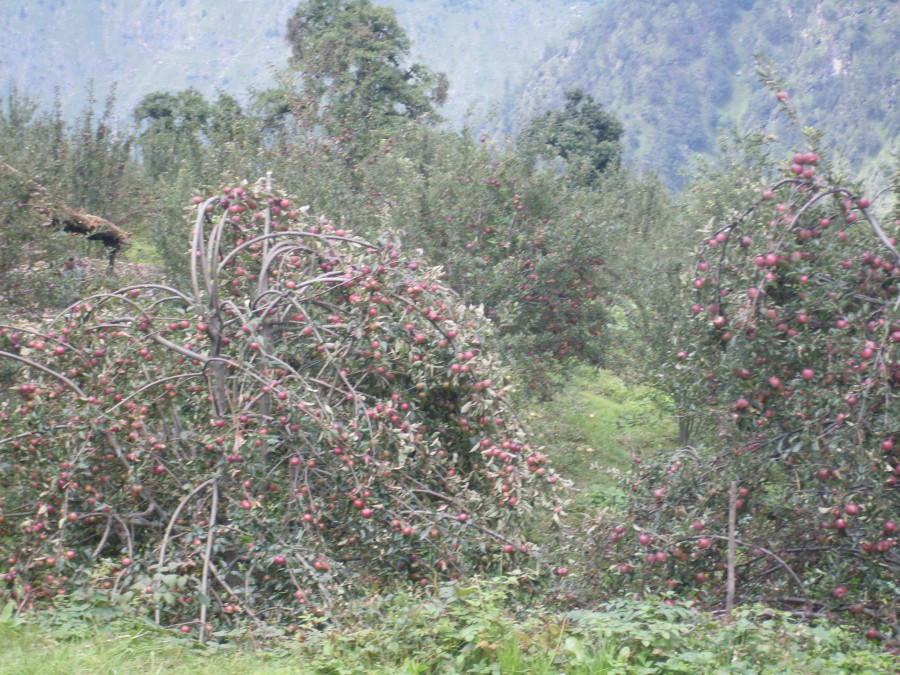Money
Apple farmers in Karnali province hit by crop failure
Drought during the flowering period and hailstorm during the fruit-bearing period affected output, farmers say.
Tularam Pandey
Apple farmer Gokarna Prasad Upadhyaya became bankrupt after his trees did not bear fruit this year. The fruit grower from Phukot village in Karnali province had gathered a bumper harvest last year which earned him Rs185,000.
He had to carry the apples on his back to market as there are no transportation facilities in this remote place in north-western Nepal. This year was a disaster as his crop failed due to severe climatic conditions.
Upadhyaya has harvested around 400 kg of apples this year, nothing compared to his usual annual production of 20 tonnes. “And even these apples I sent to relatives as gifts,” said Upadhyaya. His orchard contains 450 apple trees.
Many apple growers in Kalikot district have been hit by climate change this year. In addition, Covid-19 came and added salt to their wounds as buyers did not show up in the villages of Kalikot where transportation is still a distant dream.
Apple growers in the Karnali province have been suffering for decades due to lack of transportation services. Even when they have a bumper harvest, they are forced to sell their fruits at a cheaper rate.
“Porters charge Rs500 to carry a sack of apples to nearby markets, and most of the farmers still feed the fruits to their cows,” said Upadhyaya.
After the Nepal Army constructed the Surkhet-Jumla road in 2007, linking the Karnali region with the national highway network, apple growers had started commercial farming hoping that one day they would get better market access and income.
But the 232-km road is in poor conditions. It has many sharp turns and blind corners making travel hazardous. Locals and travellers who use the road have to suffer hardships all year round because it becomes unbearably dusty during the dry season and extremely muddy during the rainy season.
For farmers like Upadhyaya, it takes several hours to reach Surkhet.
Kal Rokaya, another apple grower from Raskot, had earned Rs200,000 from his apple crop last year. This year, he earned nothing. He has 500 trees in his orchard.
“The winter drought (January-February) during the flowering period and hailstorm during the fruit-bearing period (April-May) destroyed my crop completely,” said Rokaya.
Last year, the government declared Raskot an apple zone and spent Rs9 million to build a solar store, irrigation system and high-tech nursery, and distribute subsidised apple saplings.
But the government has no programmes to deal with effects of climate change. Tilagupha, which is known as a fertile land for apple farming, was the hardest hit this year.
Despite the adverse weather condition that destroyed local apple crops this year, apple farmer Tek Bahadur Shahi still managed to earn Rs400,000. Last year, his income totalled Rs1.3 million.
“The climate factor affected the harvest, and we were forced to sell our fruits at a very cheap price,” said Shahi, who has 3,500 apple trees in his orchard.
“This year, adverse weather caused apple production to plunge by 60 percent,” said Bharat Basnet, chief of the Agricultural Development Office in Kalikot. More than 14,000 tonnes of apples could be produced in Kalikot district this year, he said.
Tek Bahadur Shahi said that he sold 20 tonnes of apples at Rs65 per kg last year. But this year, according to Shahi, he got Rs50 per kg and was able to sell only 8 tonnes.
“Buyers did not come to the farmers this year due to Covid-19 related restrictions and fear of infection.”
For apple farmers in the Karnali region, roads and access to market have been a dream for decades.
"Farmers in Kalikot were encouraged to plant apple trees as they expected their farms to bring them prosperity," said Navaraj Koirala, a leader of the Nepal Workers and Peasants Party. “Before Karnali had road access, farmers used to feed apples to their cattle. Now, they take them to market.”
Lawmaker Koirala, who has 600 apple trees in his orchard, said apple, mushroom and tourism are three key components that can bring prosperity to this remote Karnali region.
“But all these dreams of the people have been shattered as the government has not paid any attention to the development and prosperity of Karnali province,” he said. “There is a road but it is in a very bad condition.”
Local farmer Dadhi Singh Karki had thought that after the Karnali highway was constructed, trucks would bring subsidised rice to Karnali and transport their apple harvests to market. “The road was constructed but it is no good. We still carry apples on our backs and walk several hours to market.”
Until last year, a few traders from Surkhet and Nepalgunj used to come to the farmers bringing cartons to pack the apples. But this year they did not come because of the virus.
A few years back, apples used to rot on the trees in Jumla, Mugu and Kalikot districts. “Farmers used to sell two apples for Rs1. Now they are getting Rs50 per kg or Rs20 per apple” said Ratan Bahadur Shahi, president of the Kalikot Chamber of Commerce and Industry.
Air transport is the primary way for traders to transport apples to market. The road network has raised the economic status of farmers, and traders even go directly to the farmers’ doors to buy apples. This has empowered apple farmers to negotiate prices in their favour.
Not only farmers but schools are also benefiting from the apple farms. In Tilagupha, Mahadev Secondary High School has planted 3,000 apple trees and 2,000 of them have started bearing fruit. The school sold apples at the rate of Rs1 for two and earned Rs200,000 last year.
The money was used to buy solar heaters, computers and a video camera for the school. “With the income from growing apples, we have hired two teachers,” said Nardeep Shahi, the headmaster of the school. “But this year, we are facing financial difficulties as the apple trees did not yield fruit as expected.”
Apple trees were first planted in Kalikot in 1970 by Dhir Bahadur Hamal, a former member of the National Panchayat during the Panchayat system. Around 3,000 apple saplings was brought from Kashmir, India and distributed to farmers in Kalikot.




 9.51°C Kathmandu
9.51°C Kathmandu















